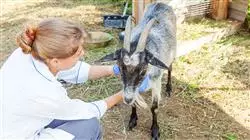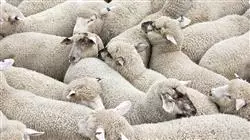University certificate
The world's largest faculty of veterinary medicine”
Description
The most relevant and complex areas of Ruminant Internal Medicine, with the most advanced concepts of intervention in this field, developed along the most up-to-date training"

Neurological diseases are frequent in ruminants. This postgraduate diploma provides students with the necessary tools to identify the main neurological pathologies in cattle and small ruminants. Ruminants can develop neurological diseases, which, if unknown, are virtually impossible to diagnose.
Metabolic diseases represent one of the main causes of consultation in the ruminant clinic, being particularly important during peripartum, since metabolic problems such as puerperal hypocalcemia and ketosis in cattle, or pregnancy toxemia in small ruminants, are directly linked to endocrine function. This module will address metabolic disorders along with the accompanying endocrinopathies.
Infectious and parasitic diseases are very frequent in ruminants and have a very important implication for the management of the rest of the animals in the same farm or even for public health if they are zoonoses. In-depth knowledge of the diagnosis, treatment and prevention of these diseases is essential for the clinical veterinarian.
Essential yet rare training for the specialist veterinary clinician that will set you apart as a specialist in this field of work"
This postgraduate diploma in Ruminant Internal Medicine contains the most complete and up-to-date educational program on the market. The most important features of the program include:
- The latest technology in Online teaching software
- A highly visual teaching system, supported by graphic and schematic contents that are easy to assimilate and understand
- Practical cases presented by practising experts
- State-of-the-art interactive video systems
- Teaching supported by telepractice
- Continuous updating and recycling systems
- Autonomous learning: full compatibility with other occupations
- Practical exercises for self-assessment and learning verification
- Support groups and educational synergies: questions to the expert, debate and knowledge forums
- Communication with the teacher and individual reflection work
- Content that is accessible from any fixed or portable device with an internet connection
- Supplementary documentation databases are permanently available, even after the course has finished
The clinical, specialized and advanced fundamentals, based on veterinary evidence, that will allow you to face the daily intervention in cattle and ruminants"
Our teaching staff is made up of professionals from different fields related to this specialty. In this way, TECH makes sure to offer professionals the up-to-date objective it intends. A multidisciplinary team of professionals trained and experienced in different environments who will develop theoretical knowledge efficiently, but, above all, will provide students with practical knowledge derived from their teaching experience: one of the differential qualities of this program.
This mastery of the subject is complemented by the effectiveness of the methodological design. Developed by a multidisciplinary team of e-Learning experts, it integrates the latest advances in educational technology. In this way, the student will be able to study with comfortable and versatile multimedia tools that will give them the operability they need in their training.
The design of this program is based on Problem-Based Learning: an approach that conceives learning as a highly practical process. To achieve this remotely telepractice will be used: with the help of an innovative system of interactive videos and learning from an expert you will be able to acquire the knowledge as if you were facing the case you are learning at that moment. A concept that will make it possible to integrate and fix learning in a more realistic and permanent way.
With the experience of working professionals and the analysis of real success stories, in a high-impact training approach"

Supported by evidence, the approach of this program will allow you to learn in a contextual way and acquire the skills you will really need in your daily practice"
Objectives
The completion of this postgraduate diploma provides the veterinary professional with specialized and advanced clinical fundamentals based on evidence to face the daily clinical practice in cattle and ruminants.
Additionally to this up-to-date approach to the problems encountered in daily clinical practice, the bibliography provided and the structuring of the topics will allow you to keep this knowledge up to date.

The postgraduate diploma in Ruminant Internal Medicine will allow the veterinary clinician to update and broaden their knowledge and skills in Ruminant Medicine and Surgery"
General Objectives
- Provide specialized knowledge of the most common neurological problems in ruminants
- Identify all clinical signs associated with each neurological disease
- Establish the specific clinical approach for each pathology
- Determine the prognosis and the most appropriate treatment in each case
- Address the main ocular pathologies affecting ruminants, their diagnosis and treatment
- Determine the importance of ocular diseases in ruminants
- Analyze the economic and health impact of diseases with ocular signs
- Develop screening procedures and specific treatments for ruminants that differ from other species
- Examine the main diseases and their specific treatment
- Generate specialized knowledge of the most frequent dermatological problems in cattle and small ruminants
- Identify all clinical signs associated with each dermatological disease
- Establish the specific clinical approach for each pathology and determine the prognosis and the most appropriate treatment for each skin disease
- Determine the importance of endocrine pathologies in ruminants and their relationship with metabolic diseases of the puerperium
- Generate specialized knowledge on the main metabolic diseases in cattle and small ruminants
- Examine the clinical approach to the different infectious and parasitic diseases in ruminants
- Compile the complementary methods available to diagnose the main infectious and parasitic pathologies
- Determine the general and specific treatment of the main infectious and parasitic pathologies
- Generate advanced knowledge on the prevention of the main infectious and parasitic diseases
Specific Objectives
Module 1. Neurological and Ophthalmological Diseases
- Specify the information needed in the clinical examination of the neurological patient
- Be able to perform a neurological examination in bovines and small ruminants
- Localize lesions in a patient with a neurological disorder
- Identify the main pathologies affecting the bovine brain, brainstem, cerebellum and spinal cord
- Develop the main alterations affecting peripheral nerves in cattle
- Study the main nervous pathologies affecting small ruminants
- Examine the particular examination protocols in ophthalmology in ruminants
- Enable the student to diagnose the main ocular pathologies and their relationship with other diseases
- Determine the necessary therapeutic and/or surgical treatments for each pathology
- Establish management measures and treatment protocols for the main neurological pathologies affecting cattle and small ruminants
- Develop the main ocular pathologies affecting bovines
- Develop the main ocular pathologies affecting sheep and goats
Module 2. Ruminant Metabolic, Endocrine and Dermatological Diseases Toxicology and Neonatology
- Identify the main pathologies affecting the skin of ruminants
- Analyze the origin of the problem and establish the prognosis of dermatitis
- Recognize the clinical and laboratory signs of the main dermatological diseases
- Determine the symptoms of skin diseases of infectious origin (viral, bacterial, fungal and parasitic) and propose therapeutic options
- Establish the symptoms of cutaneous and mucocutaneous diseases, and propose therapeutic and management options, and determine if it is a reportable disease
- Recognize the main cutaneous neoplasms in cattle and small ruminants, propose appropriate treatment and determine the prognosis
- Identify the clinical signs of metabolic diseases and understand the endocrinopathies associated with them, as well as their prognosis, treatment options and prevention
- Specify the diagnostic procedures used in endocrinology and their interpretation
- Recognize the main manifestations of the most frequent nutritional problems in cattle and small ruminants
- Establish management strategies to correct nutritional problems in a production system and to treat affected individuals
- Recognize the clinical manifestations of the main causes of poisoning in cattle and small ruminants
- Establish an appropriate treatment plan for animals with exposure to toxic agents
Module 3. Ruminant Infectious and Parasitic Diseases
- Identify the main infectious diseases affecting ruminants
- Establish the differential diagnosis of the clinical signs of the main infectious and contagious pathologies in ruminants
- Propose a work methodology for patients with infectious and contagious disorders
- Provide specialized knowledge to treat and prevent the main infectious and contagious pathologies in ruminants
- Understand and identify the different realities and challenges faced by ruminants according to the type of production system in which they are involved
- Be able to identify the technical differences, advantages and disadvantages of vaccines available on the market
- Be able to, depending on the infectious challenge faced by ruminants, develop an effective, efficient and economically justifiable vaccination plan adapted to the reality of each farm
- Identify the clinical signs of parasitic diseases affecting ruminants
- Specify the diagnostic procedures used in parasitology and their interpretation
- Determine a theoretical-practical methodology for the patient with parasitic diseases
- Provide specialized knowledge to establish programs for the control and management of parasites in ruminants

Join one of the largest online universities in the world”
Postgraduate Diploma in Ruminant Internal Medicine
.
If you are passionate about the care of ruminants and want to become an expert in internal medicine of these animals, the Postgraduate Diploma in Ruminant Internal Medicine at TECH Global University is the perfect opportunity for you. Through our online classes and for 6 months, you will have the opportunity to acquire the necessary knowledge to effectively diagnose and treat ruminants. Our high quality education programs are tailored to your needs. Online classes allow you to study flexibly and conveniently, from anywhere and at a time that best suits your needs. During the 6 months, you will immerse yourself in the study of ruminant internal medicine, covering key aspects such as disease diagnosis, interpretation of diagnostic tests, choice of appropriate treatments and prevention of common diseases in these species.
The course is designed to provide you with a thorough understanding of the internal medicine of ruminants.
Specialize in the care of these animals with TECH.
Here, you will have the support of an expert and highly qualified faculty, composed of renowned professionals in the field of ruminant veterinary medicine. You will also have access to specialized online resources, virtual libraries and supplementary material to enrich your learning. Upon completion of the Postgraduate Diploma in Ruminant Internal Medicine, you will have developed an in-depth understanding of the most common diseases and pathologies in ruminants, as well as best practices for treatment and prevention. You will be prepared to face clinical challenges with confidence and provide quality care to these important animals. Don't miss out on the opportunity to specialize in ruminant care and make a difference in their well-being.
Enroll today and gain the skills you need to excel in this specialized area of veterinary medicine!







